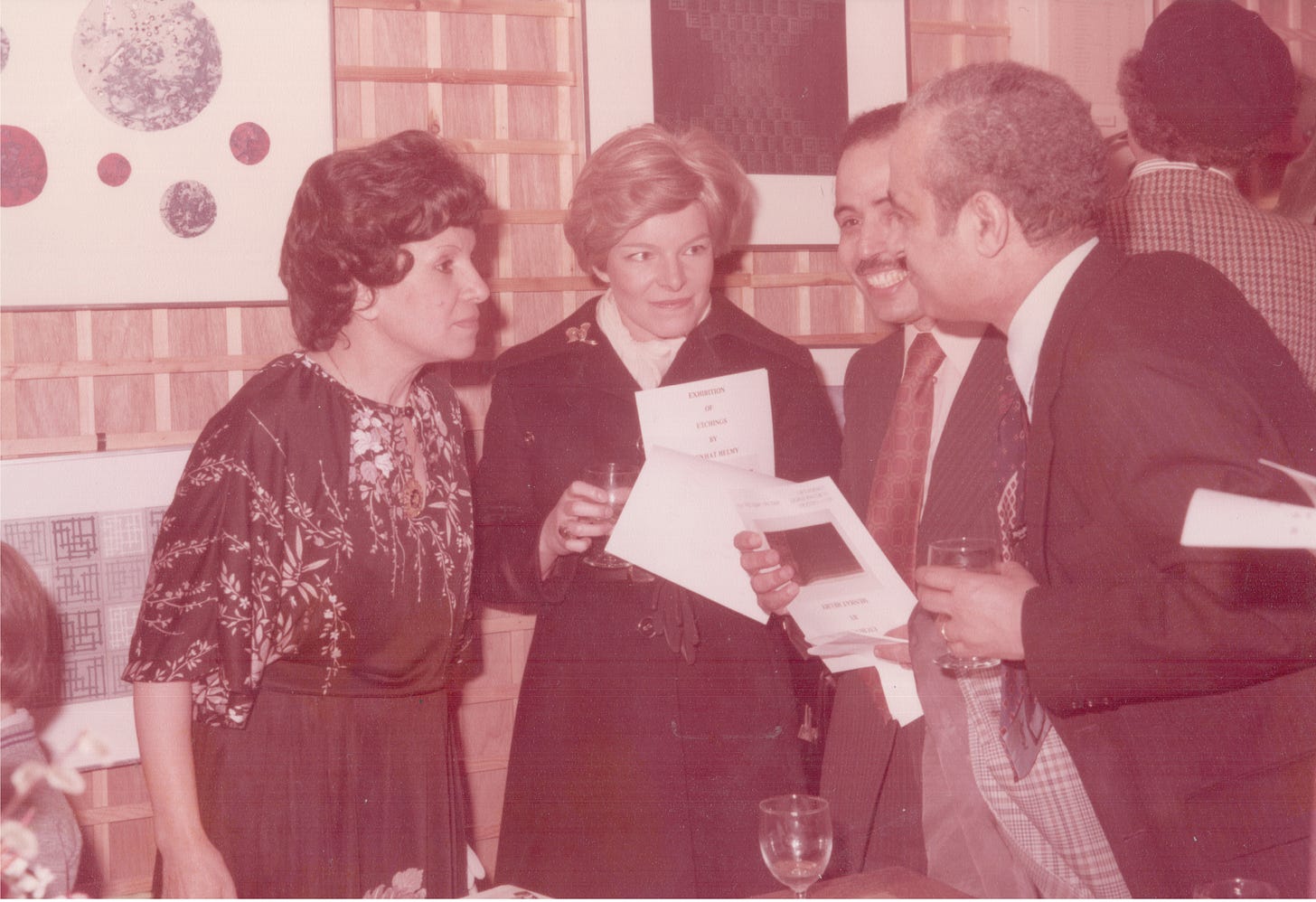What we wish we could ask Menhat Helmy
Menhat Helmy passed away on this day—May 10—in 2004. Here are the questions her daughter and grandson wish they could have asked her before she departed this world.

The Art of Menhat Helmy is a newsletter and platform supported by its readers and managed solely by the artist's family. Our goal is to persist in showcasing Helmy's groundbreaking artwork and to inspire emerging Arab artists.
If you haven't already, we encourage you to consider becoming a paid subscriber.
It has been more than 21 years since I last saw my grandmother, Menhat Helmy. She departed this world in peaceful sleep on May 10, 2004, marking the end of a groundbreaking life and career spanning countless awards, accolades, and masterpieces that continue to be celebrated to this day.
Egypt’s artists, intellectuals and educators mourned the loss of their remarkable colleague, penning obituaries and essays exalting her talent, grace, and presence. They spoke of the pioneering artist who exuded excellence in her craft and stood out among her contemporaries during a golden age in modern Egyptian art. They celebrated a woman who broke boundaries as a female artist and cemented her legacy as a printmaker and painter on an international stage. They honoured a professor who raised a generation of Egyptian artists to pursue their dreams.
Her family, too, mourned the loss of their loving sister, mother, and grandmother, as the depth of her absence slowly dawned on us. I still remember the 12-year-old me sobbing silently when my aunt first told me that my beloved grandmother had moved beyond the realm of the living—beyond the world I knew, where I could no longer find her or ask her the questions only she could answer.
For most, the memories of their departed relatives blur with the passage of time, reduced to a series of images or anecdotes to be repeated across the generations, until those too come to pass into the annals of history.
This was not the case for my mother and I.
Over the past few years, we ‘ve been blessed with the privilege of managing my grandmother’s remarkable estate, including her entire body of works and an archive of documents, books, photographs and correspondences. I’ve learned more about my grandmother’s and her extraordinary life in the last few years than during her lifetime. It has allowed me to feel closer to her, to understand her work, and to reimagine the world she occupied, to appreciate her in a way I couldn’t have imagined possible during her lifetime.
It is a privilege I cherish, but as my mother and I continue to research her work and amass new knowledge from the archive, we’ve been left with a series of questions without any answers—questions that only Menhat Helmy can answer.
Now, to mark 21 years since Menhat Helmy’s passing, my mother and I wanted to publish some of the questions we wish we could ask my grandmother, if only we just had more time.
Sara:
When you completed your diploma at the Slade School of Fine Arts in 1955, would you have stayed on in London if you had the choice?
Why did you choose to marry later than what was the norm at the time? Was it because you decided to focus on your art?
How were you able to juggle being a prolific artist, a teacher, and a dedicated wife and mother? It seems incredible that you were able to live such different lives without compromising any of those roles.
Why didn’t you continue painting or sketching when you retired from printmaking? Why did you distance yourself from your art entirely? Why didn’t you continue?
The only portraits you ever painted were of models during your time at art school in Egypt and London. Why didn’t you paint the people closest to you? Was it because that style of art didn’t speak to you?
Your artwork was truly incredible. Why did you remain so lowkey? Why did you never write about yourself or go out of your way to promote that incredible work?
Do you feel you received the recognition that you deserved?
How would you feel if you were around to see the work your grandson is doing right now?
Karim:
Did you keep a diary when you were studying in London in the 1950s? If not, why?
Why did you wait until 1966 to host your first solo exhibition? That was 11 years and multiple awards after you returned from London.
Who were the artists that you regularly corresponded with? Whom among them did you consider your friends?
What happened to the abstract painting you did following Gamal Abdel Nasser’s death?
How did you feel about Nasser?
You have no works between 1967-69. Was that because of the Naksa? Or were you focused on something else at the time?
How did you fund your trip to the Aswan High Dam in the 1960s?
Your abstract work in the 1970s was so avant-garde and ahead of its time. Where did you draw your inspiration?
When your lungs no longer allowed you to continue printmaking, why didn’t you return to painting?
If there were key defining moments in your life, what were they?
What have we gotten wrong?
The Art of Menhat Helmy is a newsletter and platform supported by its readers and managed solely by the artist's family. Our goal is to persist in showcasing Helmy's groundbreaking artwork and to inspire emerging Arab artists.
If you haven't already, we encourage you to consider becoming a paid subscriber.



